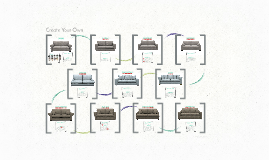Jeopardy Game Template
Transcript: Introduction to Jeopardy Overview of the Game History of Jeopardy Jeopardy is a quiz show where players answer questions in the form of answers. The game features a board with various categories and point values, incentivizing quick thinking and recall. Each correct answer adds to the player's score, fostering a competitive yet educational experience. Importance of Game-Based Learning Objectives of the Game Jeopardy was created by Merv Griffin and first aired in 1964. Initially a conventional quiz show, its unique format was solidified by the late 1960s, leading to widespread popularity and numerous adaptations across the globe. Game-based learning enhances engagement and retention, making educational content more memorable. Incorporating games like Jeopardy into teaching strategies can stimulate interest, encourage collaboration, and foster critical thinking skills among participants. The primary objective of Jeopardy is to answer the most questions correctly to accumulate points. Secondary objectives include promoting teamwork in multiplayer settings and improving general knowledge on a variety of subjects, enriching the learning experience. Jeopardy Game Template Game Mechanics Game Setup Point System Explained Tips for Hosting The game is played in a quiz show format with three rounds: Jeopardy, Double Jeopardy, and Final Jeopardy. Each player selects a category and point value during their turn to answer questions. Players earn points for correctly answering questions, with increasing point values in later rounds. Incorrect answers result in point deductions, emphasizing the importance of strategy in gameplay. Categories and Clues Answering Format The game consists of various categories covering diverse topics. Each category contains five clues, with increasing difficulty and point values, demanding both knowledge and quick thinking from players. Players must respond in the form of a question, e.g., "What is...?" This format enhances critical thinking and active participation, ensuring players engage fully with the content. An Engaging Points-Based Game for All Ages Managing Time Effectively Engaging Your Audience To maintain momentum, set clear time limits for question answering and category selection. Utilize a timer to keep track of round times, allowing for quick transitions while ensuring everyone has a chance to participate. Capture your audience's attention by incorporating interactive elements such as audience participation, themed rounds, or team competitions. Use humorous anecdotes related to the game content to keep the mood light and enjoyable, fostering a friendly atmosphere during play. Variations and Customization Handling Challenges and Disputes Keeping Score Accurately Establish clear rules regarding answers and point allocation to minimize disputes. Prepare to address challenges fairly and quickly, prioritizing a respectful dialogue among players to maintain the integrity of the game. Implement a straightforward scoring system, using digital tools or a visible scoreboard to track points. Regularly announce scores to maintain competitiveness and transparency, helping participants stay engaged with their standings in the game. Themed Jeopardy Games Themed Jeopardy games create a unique experience by focusing on specific subjects like movies, history, or pop culture. These themes increase engagement and allow players to connect with content that interests them. Custom Category Creation Digital vs. Physical Formats Creating custom categories allows hosts to personalize the game experience. Tailoring categories to suit the participants' interests, skills, and background enhances participation and makes the game more enjoyable. Both digital and physical formats offer distinct advantages. Digital formats enable ease of access and interactive features, while physical formats promote face-to-face interaction and engagement in local settings. Adapting for Different Age Groups Adapting Jeopardy for various age groups ensures inclusivity. Younger audiences may benefit from simpler questions and relatable themes, while older participants may prefer challenging trivia that reflects their experiences and knowledge.

















